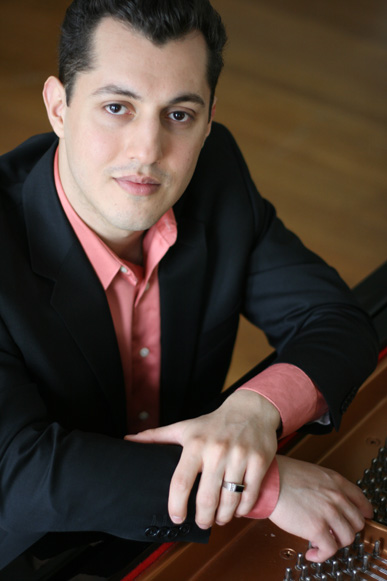No one who was in attendance at the recent concert of works by Karen Hakobyan could possibly have felt shortchanged. The Armenian composer and pianist, a musician of abundant gifts and bountiful ideas, structured an evening that was a survey of both his compositional development and his facility in writing for varied instrument groups. Mr. Hakobyan’s precocious enthusiasm for making and writing music is infectious. Indeed, it is a testament to him that all the musicians who performed his works, most of which were fiendishly difficult, seemed relaxed and fully engaged. My major reservation with this program was with its length. Simply put, there were just too many pieces to digest. A little shaping and editing would have shown the composer’s strengths in a better light.
By his own description, Mr. Hakobyan’s earlier works dominated the first half of the program. Although Elegie for Violin and Piano (1999) is a product of a fourteen year old’s imagination, it still provided some technical challenges for its players. All the hallmarks of the composer’s voice were already in evidence in the Elegie – virtuosic passagework with fistfuls of notes, and the juxtaposition of different stylistic sensibilities (late Romantic, early to mid – Twentieth century.) These, and a mania for fugues, were woven, in some form, into the next four works, a Prelude and Fugue for Piano, a stunning Toccata for Solo Flute, and two pieces for string quartet. The string quartets, in particular, showed a more developed palette of dynamics and layering of voices.
The musical language that was introduced in bits in the beginning of the program was pervasive after the intermission. Of these later pieces, the strongest were the Suite for Solo Violin, the Trio for Flute, Clarinet and Piano, and the brilliant Piano Variations, op. 1. As is often the case, Mr. Hakobyan’s assets are also his weaknesses. He is never at a loss for ideas, but those ideas would carry more weight if there were less of them. Having said that, the sheer virtuosity of his more successful ventures was a delight to hear. All of the performers were of a very high standard, but special kudos must go to the flutist Emi Ferguson and the violinist Guillaume Molko.

